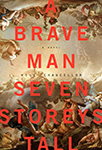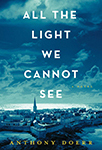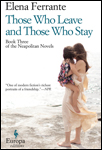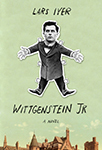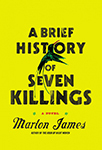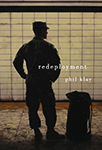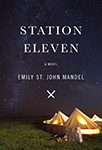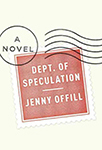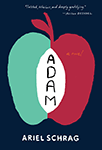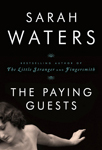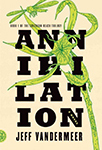by Jesse Ball
30% OFF at Powell’s »Christina Bevilacqua: Some months ago I read a Paris Review interview in which Geoff Dyer observed, “It really is the case that as you get older you read less fiction. And then by the time you are my age, it’s really quite minimal the amount of fiction that one reads. As I’ve joked before, the next stage along that path is that you only read military history.”
“Ridiculous,” I scoffed—only to be suffused with the horrified realization that my current reading list consisted of a half-dozen histories on either the American Civil War or the French Revolution.
How had this happened? I had always devoured fiction! Hadn’t I just the other day recommended Strong Motion, the wonderful new novel by that relative unknown, Jonathan Franzen?
This tournament, then, arrived just time to save me from a life of battle analysis. I’d read about nearly all of the books under consideration, and there were even a few that I’d told myself I intended to read. So whether I wanted to convince myself that I was one of those fresh, hopeful types who still read fiction, or just that I was still up to the task of doing so, I looked forward to getting my books.
And then I got them: Silence Once Begun by Jesse Ball, and Redeployment by Phil Klay. Being the punctilious, inflexible sort of person who only reads military history (as I now knew myself to be), I reacted peevishly at not getting any of the books I had told myself I intended to read, and although Redeployment had just won a National Book Award, I groaned when I saw it. I groaned because I didn’t want to have to read about the Iraq War, I groaned because I am the sort of craven person who only reads sanitized military history and not about the lives being destroyed in and by the military of my time and country, and I groaned at all the devastating failures of character that I’d already been forced to admit to myself before I'd even opened the book.
So I decided to start with Silence Once Begun. On the first page, “The following work of fiction is partially based on fact,” is accompanied by a tiny black-and-white photograph of a snapshot showing a person in front of a wall. The next page, titled “Prefatory Material,” sets out in language alternately poetic and clinical a brief purporting to explain the genesis (poetic) and methodology (clinical) of the investigation that the book will describe; it literally contains the line, “That led to the book you now hold in your hands.” I was ready for my job as reader: Just how unreliable is this narrator?
The book is obliquely about police in a Japanese town receiving a written confession to a series of unsolved murders, and the confessor, sentenced to death, refusing to speak to interrogators, family members, or a young woman who visits him. But what’s really being “told” is the narrator’s (and, of course, the author’s) contemplation of what it means to observe, speak, write, listen, and record, and of what it is that is communicated—what it means—when a person chooses to not do any one of those things. The mysterious young woman who visits the silent confessor writes to the narrator:
Of silence, I can say only what I heard, that all things are known by that which they make or leave—and so speech isn’t itself, but its effect, and silence is the same. … there is no end to speaking and the time comes when speaking is less than saying nothing. But still we struggle on.
I struggled on, intrigued by a world in which every seeming answer held more doubt. Then, toward the end, a love story suddenly emerged that I think was meant to cut through the self-conscious documentariness of the book and return it to poetry, but which for me wrecked the whole soufflé because it was so precious and, weirdly, so literal. I kept hoping that the self-consciously clunky “reality” of it would be revealed to be as open to interpretation as what had come before, but finally concluded that no, this “love” was meant to be beyond language, beyond reason, beyond narration. Alas, it was also beyond belief, and a letdown.
I prepared for battle, opened Redeployment, and was pulled immediately into a world about which I knew nothing, and where I forgot myself entirely. All I wanted to do was read ahead, read ahead. The characters in these dialogue-filled, first-person stories represent a variety of Americans, military and non-military, serving in Iraq or just back from service. Their speech is so natural that it could have been taken from transcripts, but to assume so would be to underestimate Klay’s abilities. Like his characters, Klay wields words with care, and like Ball, he writes about what we say by not saying. But Klay’s book made me feel the motivations via scenes that were visceral and searing; I wasn’t solving elegant puzzles to figure them out. His characters use, misuse, and distort language as both offense and defense, and choosing or refusing to articulate their situations is one of the ways in which they attempt to make sense of the senseless world in which they now live (or die) and work (or try to):
“The stories [were] becoming stronger every time I retold them, feeling more and more true.”
“You’re just an animal, doing what you’ve been trained to do. And then you go back to normal terror, and you go back to being a human, and you go back to thinking.”
“My mind was whirling, and I made it stop.”
“Timhead was right, but it wouldn’t do either of us any good to think about it.”
“… the sight of us reminding Marines of everything they know but never discuss.”
“I tried not to think about anything.”
So. Both books were great reads, but while Ball’s world engaged me while reading, once finished I could barely remember it. The stories, characters, and writing in Redeployment, though, won’t let go. Klay made me aware of the blasted, wasting world going on around me, and grateful for the chance to see it up close, before anyone had figured it out for the history books. That’s why I (used to) read fiction! And that’s why Redeployment gets my vote.
Kevin: Before we get started, I want to say that if you combine the above Geoff Dyer observation that “as you get older you read less fiction” with the overwhelming statistical evidence showing that the average reader of fiction thinks bedtime is what comes immediately after 60 Minutes, then those of us who write and teach and promote fiction for a living are truly and thoroughly screwed.
John: Speaking from experience, there’s nothing wrong with early Sunday bedtimes, and dinner at 4:30 p.m. is just as good as 7:30 p.m., plus you have time to digest your meal before going horizontal, which is good for your regularity…oh my God, I’m an old person!
I am for sure out of step with this opinion, but I am only mildly impressed with Redeployment. I think it’s because I might read too many short stories, and maybe because I’ve spent some time trying to help college-age people understand how to better write stories. Let the haters hate, hate, hate, as to whether or not that’s a productive use of one’s time.
Which is all to say that reading the stories of Redeployment, as powerful as the material is, I feel like I knew what was coming because they are the moves of the “contemporary” MFA short story that one sees in prestigious literary journals, such as Granta, which first published the title story.
[Spoiler alert.]
When the sick dog, Vicar, shows up in Redeployment, I knew the end, not only the events and action, but the technique of moving between the narrator’s past in Iraq and the present, the juxtaposition of theme and motif. Klay’s skill is undeniable, but I knew this play and it was a letdown that the story didn’t manage to surprise me.
Additionally, I’m afraid I just don’t buy the narrator’s method of dispatching Vicar as anything other than a conscious move motivated by a desire to achieve a kind of surface-level aesthetic harmony. For the narrator to euthanize his dog with three shots from distance, as opposed to one to the head from close range, is nonsensical as anything other than artistic flourish. In the world the author had constructed, the only reason for that character to take those actions at that time is because the author willed it to happen.
As a reader, I didn’t buy it. Obviously, thousands have begged to differ, and no doubt my response is rooted in aesthetic preference for surprise, for short stories that in some way interrogate the form or that refuse to conform. I am in the midst of reading Charles Baxter’s newest collection, There’s Something I Want You to Do, and with every story thus far (I’m about a third of the way in), there is something off-kilter and wonderful around the corner. I get the sensation that Baxter was likely surprised by his own stories, even as he was writing them—that they are narratives of discovery for both writer and reader.
To me, Klay’s stories are consistently too shapely, too “well-made” to hold interest. But that’s me.
Kevin: Sometimes our reactions are influenced by external events. Redeployment won this year’s NBA, but if Klay was in your class along with some of the other contenders—Anthony Doerr or Jenny Offill, for instance—he would not be the guy setting the curve, right? Especially for someone who reads as much as you do, John, it must be hard to look at this collection and endorse its coronation as the Book of the Year.
John: It’s true that the fact that it won a major literary award, taking down All the Light We Cannot See and Marilynne Robinson’s Lila, among others, had me thinking that it’s an all-time classic, along the lines of The Things They Carried, to which Redeployment is often compared. But Redeployment is only very good, which sounds ridiculous, even as I think it.
Kevin: Klay is very talented, as you say, and I think his instincts are outstanding. But he is also pretty new at this game. For instance, the narrators in each of these stories have different names, but they all sound like exactly the same guy. Of course, that’s because they are—they are all Phil Klay. And in the workshop, you and me and Phil and Jenny and Tony would knock around ways to make our fictional voices a little less autobiographical, and then, if it were Friday, we’d go to the bar near campus where they have the Scrabble games that are missing the Q and Z tiles, and we’d drink beer specials and play Cards Against Humanity until two of us—and I’m not saying which two—end up in a sexual encounter we immediately regret. (I didn’t go to grad school. This is just how I imagine it always going.)
Anyway, this might be the six-dollar bucket of Rolling Rocks talking, but I’m going to join Judge Bevilacqua in an enthusiastic defense of Redeployment. I’ve read my share of fiction and nonfiction concerning the wars in Iraq and Afghanistan. I’ve watched documentaries. I’ve had long talks with friends who are veterans of those conflicts. And this collection of stories felt like Truth to me, in a way many of those other inputs have not.
Fiction can get at truth through metaphor. Other times it gets at truth because it’s a safe way to describe things that are difficult to talk about earnestly. War, at least for the people who experience it firsthand, is one of those things.
There is a documentary on HBO right now called Night Will Fall. It’s about the making of a never-shown, 70-year-old BBC documentary on the liberation of Nazi concentration camps, and it is horrific. There are these incredible moments when they juxtapose footage of Allied troops moving through a death camp for the first time with those same soldiers, now in their nineties, trying to describe what they saw. They can’t do it. It’s too painful. They can’t say the words.
I’m certainly not claiming everything that happens in these stories happened to Phil Klay. But by substituting a different name (Sgt. Price in the title story, for instance) and by substituting other names for his family and friends and fellow soldiers, he is not only able to take all the liberties with true events that fiction allows, he is able to talk about the effects of war on the ordinary human beings who fight it in a way that is far more honest than he could in memoir.
I’ll point to a different story in Redeployment, “After Action Report.” It’s about a young soldier (LCpl. Suba this time) who has never killed anyone, but who the other soldiers mistakenly credit for a kill. He has to imagine what it’s like to have killed someone so he can pretend to be someone who has killed someone. It’s a clever device. Rather than putting the reader in the soldier’s place, he puts the soldier in the reader’s place. Some of these stories are a little green in places, but that was a sophisticated and effective move.
There are a million history books about World War I for you to read (as Mr. Dyer says) “as you get older,” but kids still read All Quiet on the Western Front in school because it is true in a way the history books can’t be. So it is with Redeployment.
John: Coincidentally, while considering this commentary, I ran across Tim Parks’s recent essay in the New York Review of Books, in which he ruminates on the notion of “authenticity” in fiction. He says, “This is how I construe authenticity: however many ways the author reworks his material, it is recognizably his.”
This resonates with me—it is one of the qualities I treasure above anything else in literature—and for my money, Jesse Ball is one the most authentic writers working today. Judge Bevilacqua tips the matchup for Klay because she finds the stories memorable, and I agree, I remember the events of the stories in Redeployment better than the events in Silence Once Begun, but for Silence Once Begun, nearly a year after reading it, I can still recall the feelings it evoked in me: confusion, curiosity. I remember going online after finishing the novel, trying to figure out what was “true” both about the central incident and Jesse Ball’s own life. I had a sudden interest in the state of Jesse Ball’s marriage, which made me feel like a creep.
Kevin: Loads of writers get the overused Kafkaesque label (or as I prefer to write it, “Kafka, Esq.”), but Ball is the one guy who, for me, really earns it. I’ve said that reading as an adult is often about trying to recapture the feeling you had reading books when you were younger, and Ball’s novels make me feel like that amped-up kid reading The Trial in freshman seminar who just realized that no one actually knows anything about who we are or why we are here or what the hell we’re supposed to do. Reading his novels is like coming out of a dream. Each one of them is profound and beautiful and makes me seem like a different person than I was, even if I can’t remember exactly what happened in them. I love that. He is one of my favorite writers today, even though I don’t regularly read any other authors remotely like him.
John: Silence Once Begun had wormed its way into me in a way that the stories of Redeployment couldn’t manage. I don’t really wish to litigate the whole “MFA fiction” canard: The diversity of what comes out of graduate programs in creative writing instantly falsifies the idea that there is one kind of story being taught faster than Rand Paul disqualifies himself from being president when asked about vaccinating your children. Ball and Klay are both MFA holders, and Ball teaches as well.
But for me, Redeployment feels “workshopped,” where I don’t even have words for Silence Once Begun.
Kevin: Tomorrow we wrap up the opening round as Celeste Ng’s Everything I Never Told You takes on Elena Ferrante’s Those Who Leave and Those Who Stay. We’ll also find out which of the opening round knockouts still have a chance to come back in the Zombie Round (as well as which books are gone for good).



